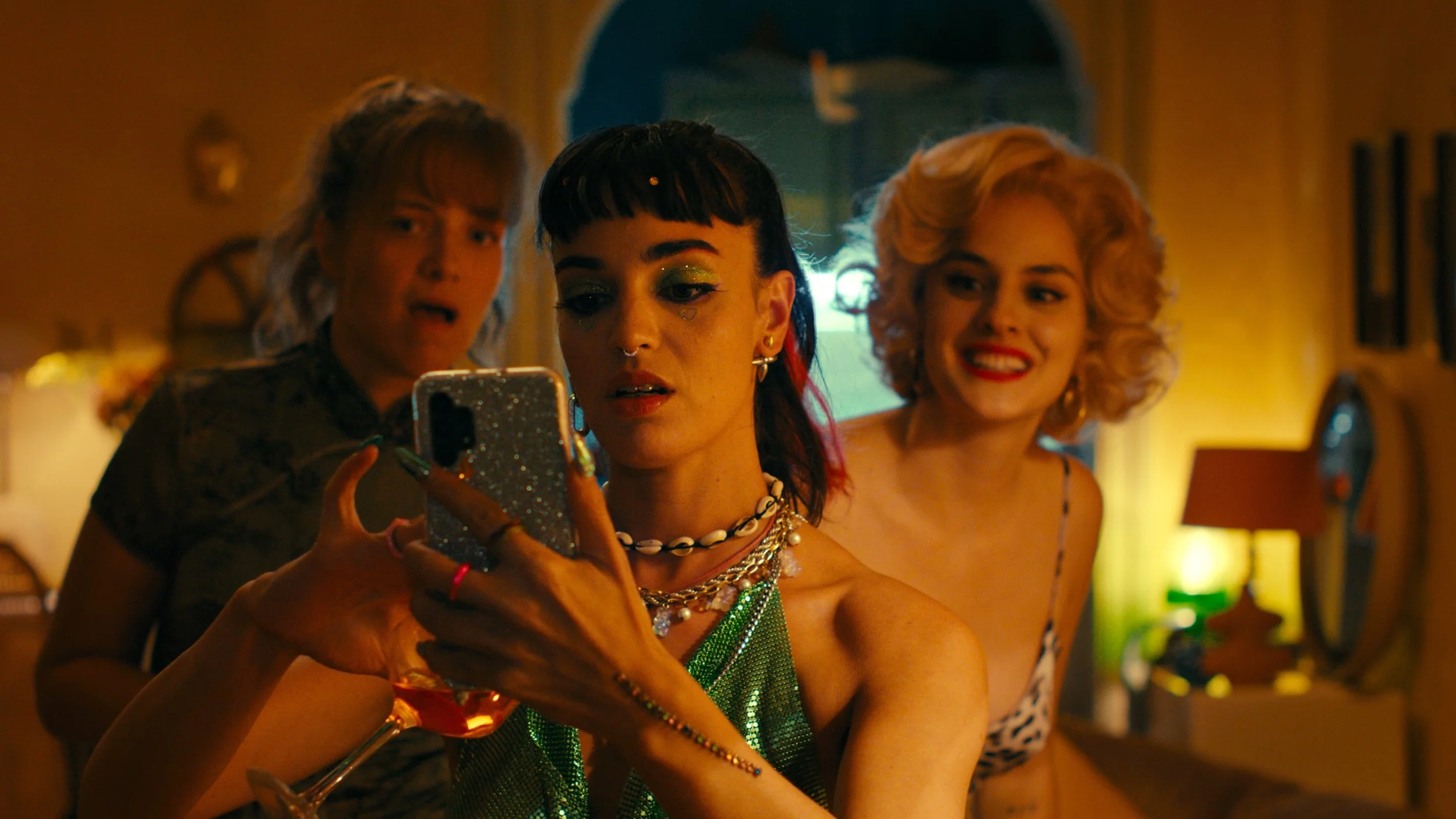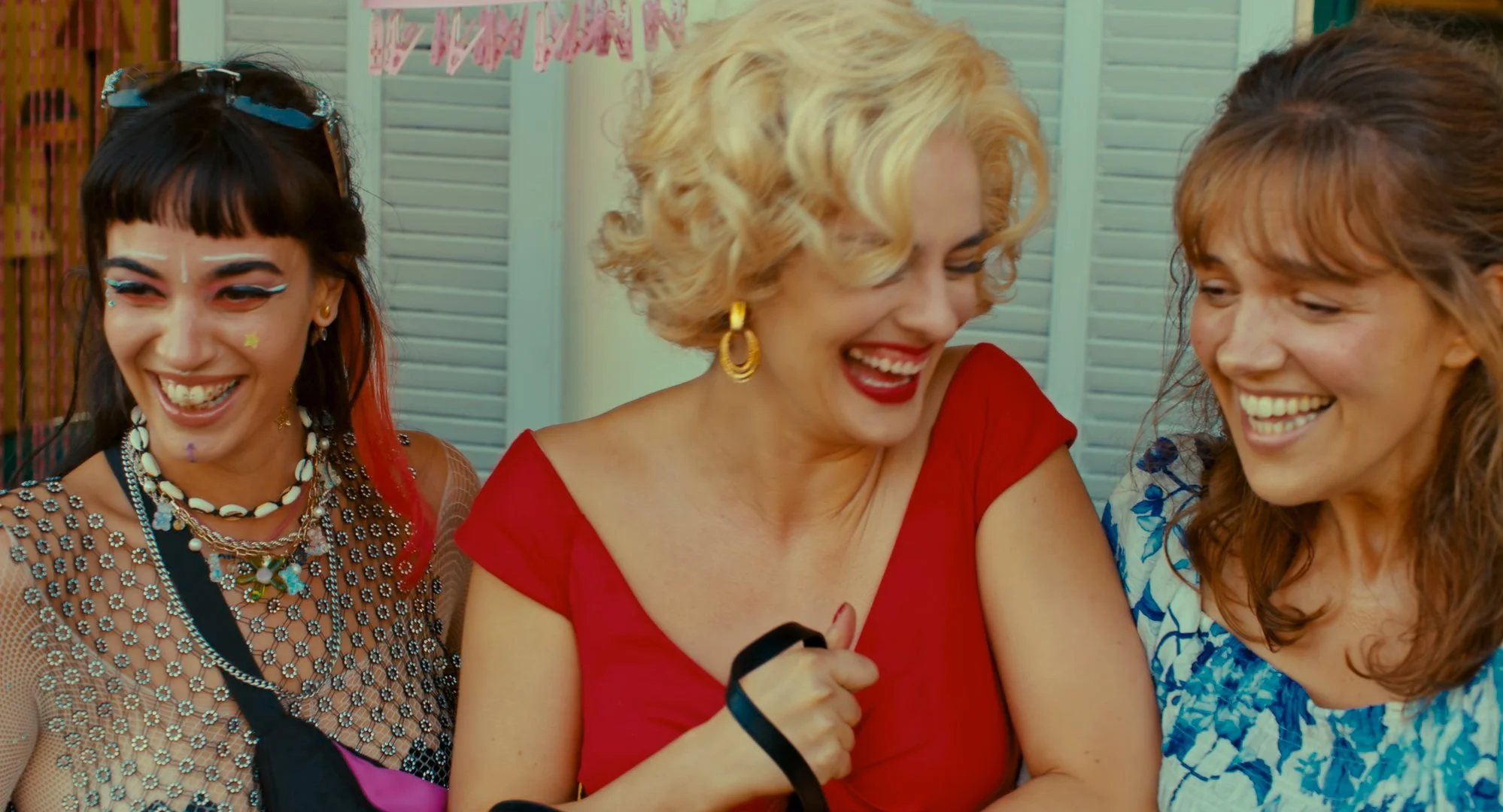‘The Balconettes’ Review: Female Friendship Sizzles and Shines in Noémie Merlant’s Genre-Bending Second Feature
The Forge
While Noémie Merlant has been heralded for many years in her native France, the actress-turned-filmmaker truly broke onto the international scene with her spellbinding lead performance in Céline Sciamma’s 2019 magnum opus Portrait of a Lady on Fire, a work that has arguably informed how women and femininity will forever be depicted on the silver screen.
For her sophomore directorial effort, The Balconettes, which begins its North American theatrical release on August 22 after world premiering at the Cannes Film Festival in 2024, Merlant once again re-teams with Sciamma (who serves as co-writer) to deliver an exceptionally feminist genre mashup centered around a trio of longtime girlfriends who rise against the men fighting to control them amid a midsummer heatwave in the South of France. Unexpected in the direction of its narrative tones and satisfying in the emotional journey it captures, The Balconettes operates as an intellectual and entertaining addition to the “summer movie” canon.
The Balconettes kicks off with an enchanting dolly shot, illuminated by the smoldering Mediterranean sun, the camera elegantly gliding over the hodgepodge balconies of an aged Marseille city block. Many of the terraces feature neighbors waving to one another through the blinding rays, or parents yelling to their offspring on the street below. However, the camera chooses to rest on one terrace in particular, where a bruised and bloodied woman snaps in the intensity of the heat (46 degrees Celsius, a horrifying 115 degrees Fahrenheit) and slashes her presumably abusive husband’s skull with a garden trowel before smothering him to death. The transformative manner of this opening sequence entrancingly braces the audience for the raucous ride to come.
From this grisly scene of mariticide, The Balconettes reframes its focus to the apartment two doors down, where the film’s eponymous ladies have constructed their cozy sanctuary. We first meet Nicole (Sanda Codreanu), a sheepish writer working on her first novel, who seeks the reprieve of fresh air on her balcony in between bouts of writer’s block and disparaging Zoom calls from her (male) professor, whose advice always seems belittling and never supportive. Nicole lives with Ruby (Souheila Yacoub), a free-spirited alternative camgirl eternally bedecked and bejeweled in makeup and fashions that fit her singular spirit. One afternoon, the two women are surprised by the arrival of Élise (Merlant), a longtime friend who has suddenly abandoned her budding acting career and overbearing husband in Paris to seek the comforting solace of her dearest companions.
The Forge
As the women settle into a balmy evening on the balcony over rosé, cigarettes, and The Coasters playing on the radio, a beautiful scene equally evocative of Almódovar and Rohmer, their female bonding is interrupted by a text message from a handsome and mysterious new neighbor (Lucas Bravo) from across the street, who has already caught the hopelessly romantic eye of Nicole and the carnal attraction of Ruby. Fueled by wine and the intensity of the heatwave, the trio decides to visit the enigmatic stranger. The man, whose first name is never revealed, turns out to be a photographer; his work is characterized by female subjects in a variety of vulnerable poses and states of dress. While all of the women are impressed by the stranger’s uber-cool apartment and laidback demeanor, Nicole struggles to hide her attraction towards him, even though he is much more interested in Ruby.
Spurred to take Élise back to their apartment when she has too much to drink, Nicole leaves Ruby at the stranger’s apartment, where the two have planned to shoot together, marking Ruby’s first professional photoshoot. She returns hours later as the sun begins to rise, covered in blood, a hollow rendering of the vivacious joie de vivre first presented. Ruby tells her friends that the neighbor used the session as a ruse to sexually assault her. In the ensuing disarray that follows the traumatic event, the three friends combine the power of their feminine essences to support one another through and through, stopping at nothing to reprise the peace of mind and security that is constantly under threat by the men who encircle their lives.
With The Balconettes, Merlant and her filmmaking team confront nuanced perspectives on the continuation of the female power struggle in a world where men still largely construct the rules and regulations. Within the safety of their shared apartment, the women carve out a special world where, as Élise puts it, “we can only be ourselves with ourselves.” Increasingly interrupting the sanctity of this feminine space are the men who surround them, both living and dead, as the movie pivots to surprising supernatural territory in its latter segment (a narrative trapping effective to varying degrees in comparison to the exuberance of the film’s other elements).
Despite her impulsive pilgrimage from Paris to Marseille, Élise still cannot hide from the incessant phone calls and voicemails sent by her husband, Paul (Christophe Montenez), whose insecurities surrounding their marital connection and sex life evolve from bothersome to menacing as his wife retreats to her friends and away from his suffocating expectations. In a parallel situation to Élise, Ruby’s sense of sovereignty is not only endangered by her abuser, but also by the fans of her work as a camgirl, who increasingly expect transactional services even as she endures the emotional and physical aftermath of her assault, lacking any compassion for her circumstance. Despite the underlying heaviness that characterizes many of the movie’s deplorable male figures, Merlant employs plenty of humor to balance this universe of men bereft of empathy for the opposite sex, particularly through the girls’ pesky dog “Brad the Pitt” (scheduled to be castrated soon) and a wizened, deadpan male gynecologist who is more interested in playing Chinese checkers online than looking after his patients.
The Forge
Through its ventures into paranormal subplots and moments of shocking but mostly uproarious gore, The Balconettes never loses sight of the powerful connection that sustains the film’s central trio of women. Within the security of their flat (dressed to the nines with fresh flowers, tiled walls, and eclectic furnishings), Élise, Ruby, and Nicole can roll on the floor with laughter, cry in one another’s arms, and be totally free to exist as the women they wish to be, a freedom that should be afforded to all, but is instead still an existential liberty that the trials of the contemporary world continue to withhold from many women. Merlant decisively imbues every frame of the movie with a potent feminine sensibility, permitting these fictional women to seek out the autonomy they desire, whatever the costs may be.
On paper, The Balconettes appears an ambitious experiment in form and tone that could go horribly wrong in the hands of some filmmakers. Yet, Merlant’s direction confidently guides the performances and narrative arcs with much dexterity, allowing the viewer to fully submerge in the sweltering universe of the work as it fearlessly oscillates between a comedy of errors, a paranormal rape-revenge thriller, and most importantly, a portrayal of the indestructible bonds that form between women. Despite the unmistakable nods to Alfred Hitchcock’s Rear Window that characterize the introduction to The Balconettes, Merlant and her collaborators choose to subvert the former’s prominently voyeuristic male gaze to construct a film all about the indomitable and eternal forces of femininity, wrapped up in a delightfully entertaining movie perfectly attuned to the dog days of summer as the season comes to a close.
4/5
2024 | 1o4 mins | French with English Subtitles | Color
The Forge will release ‘The Balconettes’ at the IFC Center in New York City and the Landmark’s Nuart Theatre in Los Angeles in theaters on Friday, August 22, before the film expands to additional cities in the following weeks. Click here for more information about ‘The Balconettes.’


